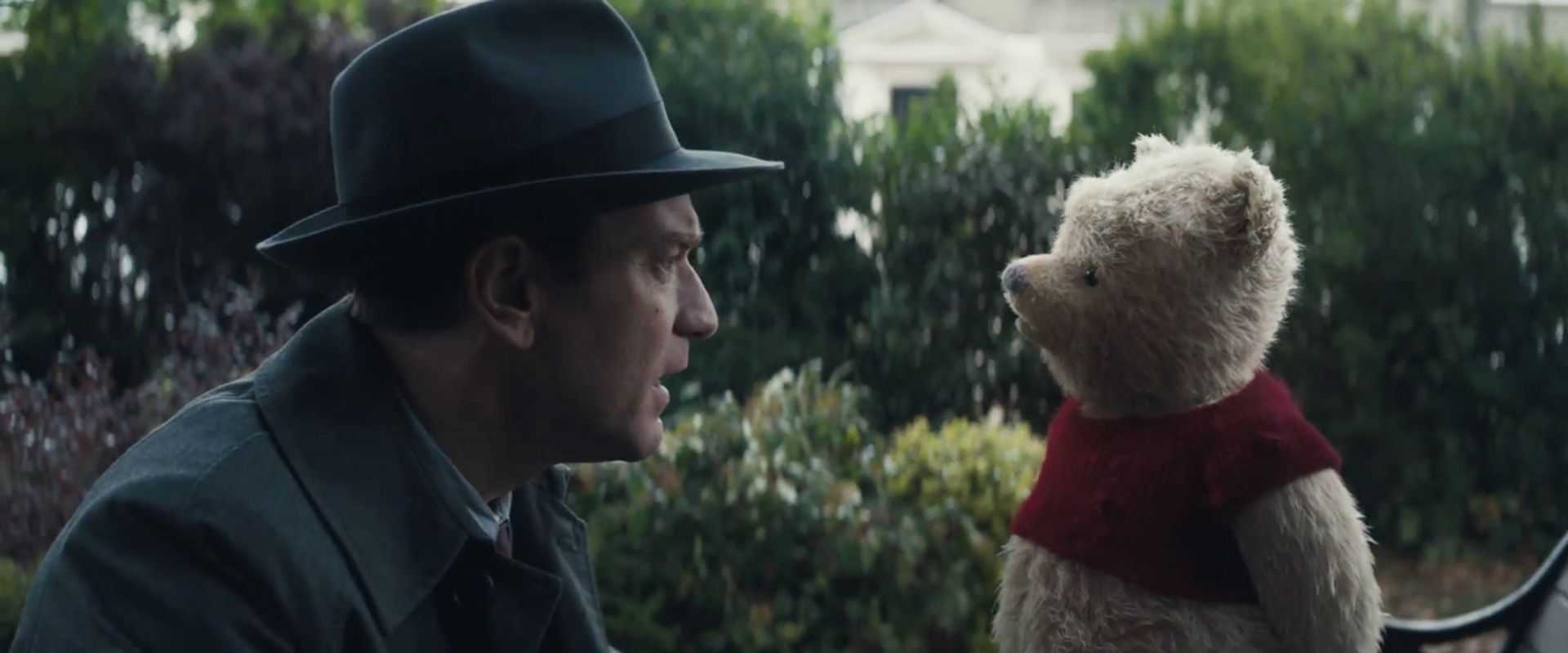Christopher Robin is an overworked father who needs a vacation.
His day job as an “efficiency manager” at a luggage company is stressful enough, but now his boss – the owner’s son — is demanding that he cut costs by 20 percent. And with his report on the finances due in just a few days, he is forced to cancel a much-anticipated summer weekend getaway with his wife and daughter so he can crunch the numbers.
He’s working hard to give his family a better life, but his wife’s not buying it.
“We don’t care,” she tells him. “We want you.”
From her perspective, she hasn’t heard him laugh or seen him have fun in years.
“Remember me?” she asks, rhetorically. “I’m your wife.”
Christopher Robin seems destined for a life full of work and no play – not to mention a strained marriage – when the unthinkable happens: A stuffed bear from his childhood visits him. He believes he’s imagining things, but then the bear – named “Winnie” – leads him to the forest and unveils other stuffed animals from his youth. There’s a donkey named “Eeyore,” a tiger known as “Tigger,” a pig called “Piglet,” and a tiny Kangaroo known simply as “Roo.”
Christopher Robin believes he can get rid of them, but the characters are on a mission. They want to help him re-discover the joys of his childhood. Will it work?
Disney’s Christopher Robin (PG) opens in theaters this weekend, less than one year after a similar-sounding movie – Fox Searchlight’s Goodbye Christopher Robin – hit theaters. But while that earlier movie told the story of author A. A. Milne and his son, Christopher Robin, the newer film shows Christopher Robin all grown up with a family, trying to find his way in life.
It stars Ewan McGregor (Star Wars prequels) as Christopher Robin; Hayley Atwell (Captain America series) as his wife, Evelyn; and voice actor Jim Cummings (Aladdin, The Princess and the Frog) as Winnie the Pooh.
The move is entertaining and squeaky-clean, with the charming and innocent elements of Paddington and Paddington 2 and the life lessons for parents found in films like Storks. We all could learn a few things from Winnie the Pooh.
“Sometimes, the [best] thing to do is nothing,” Pooh says, urging Christopher Robin to stop filling his life with busy-ness and work.
Like the Paddington films, it features a mixture of live-action and computer-generated characters.
Warning: minor/moderate spoilers!
(Scale key: none, minimal, moderate, extreme)
Violence/Disturbing
Minimal. Winnie and the other animals discuss Heffalumps and Woozles – supposed monsters in the forest – but we only hear them. Later, Christopher Robin proves they don’t exist. One dream-like scene shows Christopher Robin under water.
Sexuality/Sensuality/Nudity
None. We see Christopher Robin kiss his wife twice in public.
Coarse Language
None. The worst we hear is “what the devil” (twice) and “bum.”
Other Positive Elements
Winnie the Pooh and his friends don’t argue, don’t ridicule others, and don’t fight. It’s a refreshing difference from other modern-day children’s programs. Even when Christopher Robin says something that makes Pooh sad, the bear doesn’t retort. (The main character of the Paddington films has similar qualities.)
Life Lessons
If only every children’s movie was this positive. Children gets lessons on encouraging one another (which Pooh and his friends do) and putting others first, while parents get lessons on avoiding workaholism and rediscovering the simple joys of life – like family.
Worldview
Christopher Robin believed he was putting his family first. After all, he was working hard at the office, at nights and on weekends, to ensure they had food on the table and a roof over their heads. He even planned on sending his daughter to boarding school to prepare her for life.
But he failed to see what his daughter Madeline wanted and needed: him. She didn’t care that her father was climbing the corporate ladder. She only cared if he was going to be there to read to her, play with her and talk to her. She didn’t want to go to boarding school.
“I’m been a father of very little brain,” he says at one point, borrowing a line from Pooh.
His lesson is one that nearly all parents could learn. The family – and not work — was God’s first institution. When we get our priorities out of line, problems always follow.
What Works
The animation. The voices. The interaction between Christopher Robin and the characters. I was a big fan of Winnie the Pooh as a child. This is the big-screen Pooh that I imagined.
What Doesn’t
The movie isn’t as fast-paced as most children’s films – which is both good and bad, depending on your perspective. If you go, be patient.
Discussion Questions
- Why did Christopher Robin fail to understand the feelings of his wife and daughter? Do you think he felt trapped by his work? How could he have handled the situation better?
- For parents: Do you ever feel like Christopher Robin did? If so, how?
- For families: How does Disney’s Christopher Robin differ from other animated films?
- For children: What did you learn from Pooh and his friends about treating others? What are some ways you can encourage your friends?
Entertainment rating: 3 out of 5 stars. Family-friendly rating: 4.5 out of 5 stars.
Rated PG for some action.
